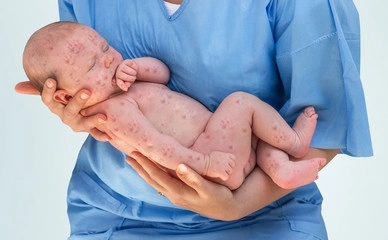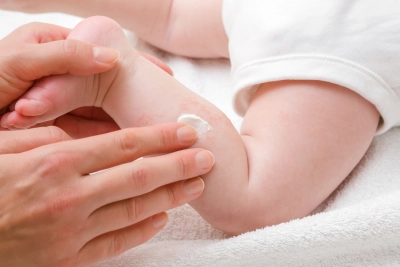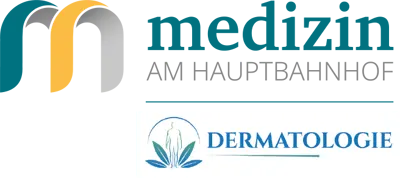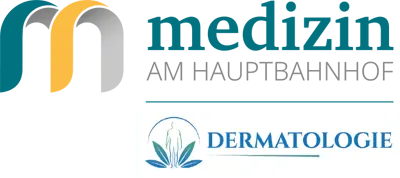 PEDIATRIC DERMATOLOGY
PEDIATRIC DERMATOLOGY
IDENTIFICATION OF SKIN CONDITIONS: HOW TO ALLEVIATE DISCOMFORT AND PROMOTE HEALING
Just as the mental and physical development of children is a permanent process of trial and error from the day of birth, the immune system is constantly striving to gain experience and develop defenses.
Photo: © andriano_cz – stock.adobe.com
As the skin is the largest organ in the body it is particularly at risk, and several skin conditions can cause concern to parents.
In this article, you will learn about symptoms, pathologies and the different risks that exist. Also, how to differentiate between classic childhood illnesses and skin diseases, what you should know about basic care for children's tender skin (sun protection, moisturising etc. ...) and when it is necessary to seek medical help.
In our Vienna practice we are available for consultations with your baby or child by appointment:
-
What symptoms indicate a skin disease in children?
-
What skin conditions can occur in children?
-
How do you recognize eczema in children?
-
What are typical skin conditions in children?
-
How can I properly care for my child's skin?
WHAT SYMPTOMS INDICATE A SKIN DISEASE IN CHILDREN?
You should always take your child to the doctor if they get a rash, fever, sore throat or headache. It could be the first sign of a typical childhood illness, such as measles, rubella, mumps or chicken pox (varicella), but it could also be the beginning of a specific skin condition.
If there are multiple reddened areas with persistent itching, perhaps already with mild inflammation, it may be atopic dermatitis (eczema) or psoriasis. Only an experienced dermatologist can diagnose this.
WHAT SKIN CONDITIONS CAN OCCUR IN CHILDREN?
We all know the diseases that are most likely to appear, at least by name: psoriasis and atopic dermatitis, also known as eczema. Chronic treatment is available and can be quickly administered if the diagnosis is received a little late.
Psoriasis in toddlers - chronic illness
Psoriasis is usually chronic and can affect young children because, in 70% of cases, the disease is hereditary.
It first appears as silvery-white scales on the skin on clearly defined, reddened areas. It is common that the elbows, knees and diaper area are affected. According to current medical knowledge, psoriasis is not curable, but the symptoms can be alleviated with the correct treatment.
Atopic dermatitis - immune system disorder
Young children are not spared from atopic dermatitis either. Under the names of atopic dermatitis or atopic eczema, it usually occurs in phases, coming and going according to triggers. Itchy, reddened and inflamed areas are the main accompanying symptoms.
It is most likely genetic, caused by a hereditary predisposition. Additional factors are the immune system and a dysfunctional skin barrier. For example, we observe an increase in symptoms in winter when the skin is not properly cared for and becomes drier. If the general susceptibility to this skin condition is present, many factors can trigger the next outbreak.
These triggers can be food as well as clothing, sweating or hygiene products. Particular attention should be paid to psychological and regular stress.
Children can especially react to the different stimuli in the environment. Observation and analysis of when and with what the relapses are triggered is of great importance. There is still no medical cure for atopic dermatitis. Coordinated treatment offers significant relief.
We would be happy to advise you on options. Please make an appointment:
HOW TO DETECT ATOPIC DERMATITIS IN CHILDREN
 As with almost every medical condition, early detection is a determining factor for successful healing or relief. With atopic dermatitis, we know that there is no real cure. Observation is therefore essential over the first few months, since your child's illness can already develop during this period. Typical symptoms are reddened areas of the skin, mostly on the face, the scalp, in the folds of the arms and legs and behind the ears.
As with almost every medical condition, early detection is a determining factor for successful healing or relief. With atopic dermatitis, we know that there is no real cure. Observation is therefore essential over the first few months, since your child's illness can already develop during this period. Typical symptoms are reddened areas of the skin, mostly on the face, the scalp, in the folds of the arms and legs and behind the ears.
The child, in a bid to relieve the irritation, suffers from severe itching which in turn causes the fingernails to damage the protective skin barrier. Bacteria can penetrate then more easily, causing inflammation of the skin.
Photo: © fotoduets - stock.adobe.com
Atopic dermatitis always has two phases:
- Acute phase: during a relapse it is advisable to consult a dermatologist who can recommend the right medication to limit the new outbreak.
- Non-acute phase: here it is important to avoid the factors that can trigger a new outbreak: clothing, pets, mites, certain foods, skincare products and of course excitement, psychological stress and general stress.
WHAT ARE THE TYPICAL SKIN CONDITIONS IN CHILDREN?
In addition to the two skin disorders already mentioned, a variety of other skin conditions can occur in children during the different developmental phases:
Abscess: Bacteria penetrates the skin and causes an infection that is initially limited to a defined area. As it progresses, pus, fever and chills accompany the inflammation. A doctor will open the abscess and drain it therefore relieving the inflammation.
Acne in newborns (acne infantorum): Male infants from the third week of life are particularly often affected. Small pimples form on the forehead, cheeks and sometimes on the hands. The reason for this may be hormonal changes after birth. Depending on the doctor's recommendation and the severity of the condition, sometimes antibiotics are prescribed. Avoid experimentation, because self-treated acne can later lead to unsightly scars. If the child shows the typical acne symptoms in the first few weeks, it is likely that they will appear later in puberty.
Herpes: the herpes simplex virus is transmitted by droplet infection or skin-to-skin contact, and the recipient will carry it for life. It is characterized by itchy blisters on the face. Fever and fatigue accompany the infection, and sometimes swelling of the lymph nodes can be observed. In the case of herpes infections, a medical consultation is recommended, since medication administered at an early stage can fight the virus effectively and shorten the duration of a relapse.
Warts: are mainly “caught” in swimming pools or saunas. It is a virus infection that leads to skin growth. The classic image of the wart is a raised area on the skin. Other manifestations of warts are verrucae on the sole of the foot and palmar warts (verruca palmaris) on the palms of the hands. They are usually not painful, just irritating and, on a cosmetic level, they do not look very pleasant.
The diseases mentioned are only an example. Children are exposed to a variety of environmental influences that can affect and weaken the microbiome as well as the protective layer of the skin. Early detection, comprehensive diagnosis and the appropriate care are important measures for prevention, relief and healing.
HOW CAN I CARE PROPERLY FOR MY CHILD'S SKIN?
At the top of every child’s skin care agenda is adequate, appropriate sun protection not only on summer vacation but also in everyday life.
Young skin is thin, and its protective function is not yet fully developed, which is why it is particularly sensitive to damaging UV rays. Unprotected children's skin can get sunburned in just a few minutes in the strong midday sun. Babies should not be exposed to direct sun at all in the first months of life. Children want to move and explore the world, but they should never be left naked in the blazing midday sun and should always be protected with a suitable high protection factor sunscreen.
The skin of babies and young children skin is also more sensitive to other external influences. It requires special care and protection.
Baby skin quickly absorbs any substance it encounters. The substance can also penetrate the deeper layers of the skin. Always choose mild cleansing products: Alkaline soaps are aggressive to the hydrolipid layer of the skin (the body's protective coat) and can dry it out.
Baby skin also tends to dry out. Sweat and sebum glands are not yet fully active, so the hydrolipid layer and the natural acid protective layer are still relatively weak.
Hot water and long baths remove lipids from the skin and thus have a drying effect. Shorten bath time and always use warm and not hot water.
The regular use of moisturizing products that have been developed for sensitive skin and have been proven to be fragrance-free and therefore better tolerated by the skin help to keep young skin healthy and in great shape. Skin problems and diseases should always be treated with specially tailored care products.
We would be happy to speak with you in our practice in Vienna about how you can best care for your child's skin and protect it from sun damage.
You are welcome to make an appointment for a diagnosis with your baby or child in our practice in Vienna:
 Photo: © JenkoAtaman - stock.adobe.com
Photo: © JenkoAtaman - stock.adobe.com



